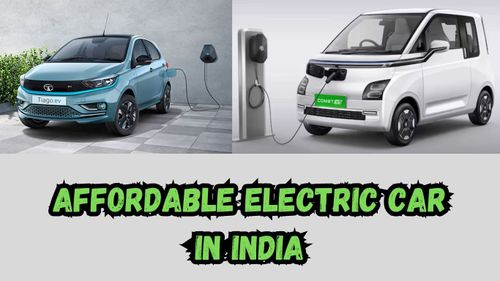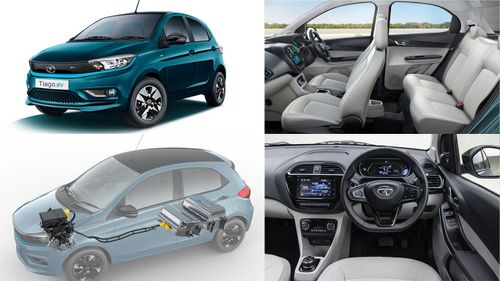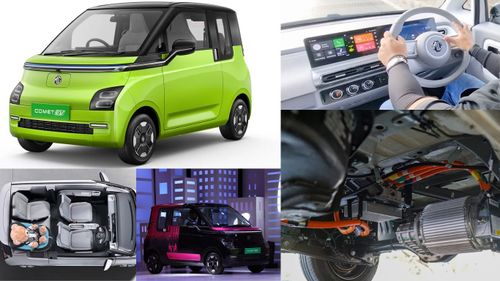Best Electric Car in India Under 10 Lakhs
By Mohit Kumar

4343 Views
MG Comet and Tata Tiago are the top affordable electric cars in India, priced under 10 lakhs. Experience eco-friendly driving without breaking the bank.

Electric cars are becoming more popular and affordable in India, thanks to the government's initiatives and incentives, as well as the increasing awareness and demand among consumers. If you are looking for an electric car that can fit your budget and meet your needs, you might be wondering which one is the best option for you. In this article, we will compare and review two of the most popular electric cars under 10 lakhs in India: Tata Tiago EV and MG Comet EV.
Best Electric Car in India
Tata Tiago EV

Tata Tiago EV is the electric version of the popular hatchback Tata Tiago, which was launched in December 2022. It is powered by a 21.5 kWh lithium-ion battery pack that delivers a range of 312 km on a single charge. The battery can be charged up to 80% in 60 minutes using a fast charger, or up to 100% in 8 hours using a normal charger.
The car has a power output of 55 kW and a torque of 170 Nm, which enables it to accelerate from 0 to 100 km/h in 11 seconds. The car also comes with various features such as regenerative braking, hill assist, ABS with EBD, dual airbags, rear parking sensors, automatic climate control, touchscreen infotainment system, etc. The Tata Tiago EV is priced at Rs. 8.69 lakh (ex-showroom).
MG Comet EV

MG Comet EV is the electric version of the compact SUV MG ZS, which was launched in June 2023. It is powered by a 28.5 kWh lithium-ion battery pack that delivers a range of 263 km on a single charge. The battery can be charged up to 80% in 50 minutes using a fast charger, or up to 100% in 6 hours using a normal charger.
The car has a power output of 70 kW and a torque of 210 Nm, which enables it to accelerate from 0 to 100 km/h in 9 seconds. The car also comes with various features such as regenerative braking, hill assist, ABS with EBD, six airbags, rear parking camera, panoramic sunroof, a touchscreen infotainment system with iSmart connectivity, etc. The MG Comet EV is priced at Rs. 7.98 lakh (ex-showroom) .
Comparison
Both Tata Tiago EV and MG Comet EV are good options for electric cars under 10 lakhs in India, but they have their own pros and cons. Here is a brief comparison of their key specifications and features:
| Specification | Tata Tiago EV | MG Comet EV ||---------------|---------------|-------------|| Battery Capacity | 21.5 kWh | 28.5 kWh || Range | 312 km | 263 km || Charging Time (Fast/Normal) | 60/480 minutes | 50/360 minutes || Power | 55 kW | 70 kW || Torque | 170 Nm | 210 Nm || Acceleration (0-100 km/h) | 11 seconds | 9 seconds || Body Type | Hatchback | Compact SUV || Dimensions (LxWxH) | 3765x1677x1535 mm | 4314x1809x1644 mm || Boot Space | 242 litres | 448 litres || Safety Features | Dual airbags, ABS with EBD, rear parking sensors | Six airbags, ABS with EBD, rear parking camera || Comfort Features | Automatic climate control, touchscreen infotainment system | Panoramic sunroof, touchscreen infotainment system with iSmart connectivity || Price (Ex-showroom) | Rs. 8.69 lakh | Rs. 7.98 lakh |
As you can see, the Tata Tiago EV offers a better range, while MG Comet EV offers a better performance and space. Both cars have similar safety and comfort features, but MG Comet EV has an edge with its iSmart connectivity and sunroof. However, the Tata Tiago EV is slightly more expensive than MG Comet EV.
Why Electric Car better than petrol and diesel?
Electric cars are often considered better than petrol (gasoline) and diesel cars for several reasons, primarily related to environmental, economic, and performance factors. Here are some of the key advantages of electric cars:
1. Environmental Benefits:
a. Reduced Greenhouse Gas Emissions: Electric cars produce zero tailpipe emissions, which means they do not emit harmful pollutants like carbon dioxide (CO2), nitrogen oxides (NOx), or particulate matter. This can help reduce the overall greenhouse gas emissions from the transportation sector, mitigating climate change.
b. Improved Air Quality: Electric vehicles (EVs) do not release pollutants or smog-forming substances, which helps improve local air quality in urban areas, reducing health risks associated with air pollution.
c. Energy Efficiency: Electric cars are more energy-efficient than internal combustion engine (ICE) vehicles, as they convert a higher percentage of the energy from their power source (typically electricity) into motion, whereas ICE vehicles waste a significant amount of energy as heat.
2. Cost Savings:
a. Lower Operating Costs: Electricity is generally cheaper than gasoline or diesel on a per-mile basis, resulting in lower fueling costs for electric vehicle owners.
b. Reduced Maintenance: Electric cars have fewer moving parts and do not require oil changes or as much maintenance as traditional vehicles. This can lead to significant long-term savings.
c. Incentives: Many governments offer incentives and tax credits to promote electric vehicle adoption, further reducing the overall cost of ownership.
3. Performance Advantages:
a. Instant Torque: Electric motors deliver power instantly, providing quick acceleration and a responsive driving experience. This can be particularly noticeable in city driving and stop-and-go traffic.
b. Quiet Operation: Electric cars are quieter than traditional vehicles because they lack the noisy internal combustion engine. This leads to a more peaceful driving experience.
4. Energy Independence:
Diversification of Energy Sources: Electric cars can be charged using a variety of energy sources, including renewable energy like solar and wind power. This reduces dependence on fossil fuels and helps transition to a more sustainable energy mix.
5. Long-Term Viability:
Future Sustainability: As the energy sector transitions to cleaner sources, electric cars are well-positioned to become even more environmentally friendly.
6. Technology Advancements:
Advances in Battery Technology: Ongoing research and development are leading to improvements in battery technology, including increased energy density and faster charging times, making electric cars even more practical and efficient.
It's important to note that the environmental benefits of electric cars can vary depending on the source of the electricity used for charging. Cleaner energy sources like renewables make EVs even more environmentally friendly.
Nonetheless, the advantages of electric cars make them a promising and sustainable alternative to traditional gasoline and diesel vehicles as the technology continues to evolve and improve.
Conclusion
The best electric car in India under 10 lakhs depends on your personal preference and requirements. If you are looking for a hatchback with a long-range and a lower price tag, Tata Tiago EV might be the right choice for you. If you are looking for a compact SUV with high performance and a spacious cabin, MG Comet EV might be the right choice for you. Both cars are eco-friendly and economical to run and maintain.